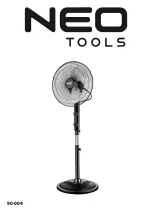
• Switch off the appliance at the installation's main
switch: a) if the appliance does not function correctly;
b) before cleaning the outside of the appliance, c) if
the appliance is not to be used for any length of time.
• Ensure that the room has an adequate source of
fresh air to ensure correct appliance operation. In
the event that other non-sealed combustion-based
appliances (such as water heater or gas stove) are
installed in the same room, check that air
replacement is sufficient for all appliances to work
effectively together.
• The appliance cannot be used to control activation
of water heaters, room heaters, etc. and it must not
exhaust into the hot air flues.
• Ensure that the appliance discharges into a single
duct (dedicated to this product) or directly to the
outside.
• The air to be extracted from the room must be clean
(i.e. free of grease, soot, chemical and corrosive
agents, and explosive or flammable mixtures).
• Do not cover or block appliance intake or outlet vents
grilles as this may prevent optimum air flow.
• T HCS Model: do not cover or obstruct the humidity
sensor grille.
• Specifications for the power supply must correspond
to the electrical data on data plate A (Fig.A)
Installation
All models: fig. 1-21
Models I, I T : fig. 22-32 (false ceiling installation)
Timer setting
Fig. 33-42
Maintenance / Cleaning
Fig. 43-47
Important information
concerning the environmentally
compatible disposal
IN CERTAIN EUROPEAN UNION COUNTRIES THIS
PRODUCT DOES NOT FALL WITHIN THE
REQUIREMENTS OF THE NATIONAL LAWS
IMPLEMENTING DIRECTIVE WEEE, AND IN
THESE COUNTRIES THE PRODUCT IS NOT
SUBJECT TO SEPARATE DISPOSAL OPERATIONS
AT THE END OF ITS WORKING LIFE.
This product conforms to EU Directive2002/96/EC.
This appliance bears the symbol
of the barred waste bin. This
indicates that, at the end of its
useful life, it must not be disposed
of as domestic waste, but must be
taken to a collection centre for
waste electrical and electronic
equipment, or returned to a
retailer on purchase of a replacement.
It is the user's responsibility to dispose of this
appliance through the appropriate channels at the end
of its useful life. Failure to do so may incur the
penalties established by laws governing waste
disposal.
Proper differential collection, and the subsequent
recycling, processing and environmentally compatible
disposal of waste equipment avoids unnecessary
damage to the environment and possible related
healthrisks, and also promotes recycling of the
materials used in the appliance.
For further information on waste collection and
disposal, contact your local waste disposal service, or
the shop from which you purchased the appliance.
Manufacturers and importers fulfil their responsibilities
for recycling, processing and environmentally
compatible disposal either directly or by participating
in collective systems
7
ENGLISH
Summary of Contents for Ariett I
Page 16: ...16 FIGURE FIGURES FIGURES ABBILDUNGEN FIGURAS FIGURER 3 3 A A A 1 1 2 2 ...
Page 17: ...17 4 4 5 5 7 7 6 6 ...
Page 18: ...18 8 8 9 9 10 10 11 11 12 12 13 13 ...
Page 20: ...20 20 20 21 21 22 22 23 23 24 24 218 218 mm mm 2 1 8 2 1 8 m m m m 25 25 ...
Page 21: ...21 26 26 27 27 28 28 ...
Page 22: ...22 29 29 30 30 32 32 31 31 ...
Page 23: ...23 33 33 34 34 35 35 36 36 37 37 ARIETT I T ARIETT I T LL 3 20 ...
Page 24: ...24 38 38 ARIETT I T HCS 3 20 60 70 80 90 60 70 80 90 39 39 40 40 41 41 42 42 ...
Page 25: ...25 43 43 44 44 45 45 46 46 47 47 ...
Page 26: ...26 Note ...
Page 27: ...27 Note ...








































